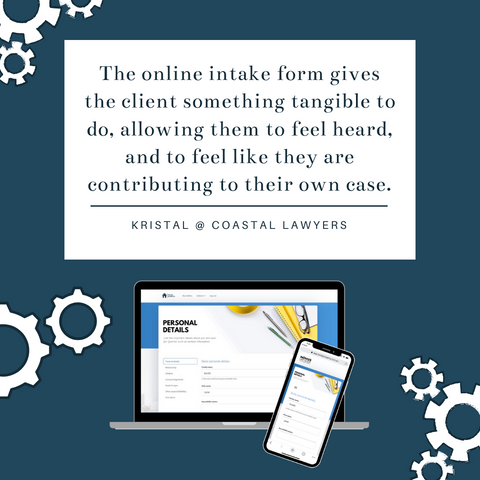The difficulty of client intake
- Tim Kirkman

- May 20, 2020
- 5 min read
Updated: May 21, 2020
One of the difficult things about being a family lawyer is that we are great listeners, it is actually fundamentally what a lawyer does, but the client does not necessarily feel 'heard'.

When the client is telling you about the fight they had in the car after their parents gave them money to purchase the house, they don't like it when you interrupt them. They definitely don't want you to interrupt them to ask how much money, what date was this, and what were the terms of this transaction (was it a gift or a loan)?

This problem is not solved by simply giving them a form. The information on the form often is not relevant to that individual's situation, they can end up answering irrelevant questions and investing time in responding to questions that don't apply to their situation.

Stop and think for a minute, for yourself, when was the last time that you truly felt listened to?
When was the last time that you felt someone truly heard you, and understood what you were going through?
How do you feel when that happens?
It is a powerful and, possibly, uncommon feeling. What if you could start your client relationship with making your client feel truly heard?

You can use our client intake form to help with this, it changes based on the client's answers so that they are not trying to find or complete information that is not relevant to their situation. More importantly though, it lets a 'robot' do the robotic parts of the client intake, so that you can focus on making the client feel that you are listening to them.
You will also come into the initial consultation with all of the background information that the client intake form collects, and therefore an opportunity to ask questions that show that you truly have engaged with the information that they provided to you.

Clients think communication is important. If you read the reports from the Legal Services Commissioner in your own state I am confident that they will have similar findings. I appreciate that people do not become a solicitor or a mediator thinking "gee I hope I don't get sued". Mostly we do it in the hopes of helping people. I encourage you to treat what people complain about the most (doing your job properly, communicating well and charging appropriately) as something that will also impact whether the client feels you have done your job well.
These things are important to clients, at both ends of the spectrum. It can be what helps them the most, and it can be what aggravates them the most.
If you like you can read the Office of the Legal Services Commissioner's Report by clicking here.

I think that we all know this, we all understand that soft skills are important, and we all understand that it is our job to listen. I also think that, like with any skill, it is important to remember the basics.
It is particularly important to remember the basics if you are revisiting why or how you do things, or if you are looking at your processes or workflow. How does your client intake process emphasise this foundational element of doing your job well?

Lawyers and mediators are very good listeners, but that isn't enough.
Does the client feel heard?
Not only must you hear, but you must be seen to be listening.

When your client talks to someone else about you, do they say that you really listened to them and understood them?
Shouldn't that be a primary goal of your's, to make clients feel that way? Even if you are only concerned about client retention and referrals for more work, this is what you want clients saying when they talk about you.

I would guess-timate that in 95% of my matters I have said, during the client onboarding process, do not buy a dog and bark yourself. (I am the dog). Let me try communicating with the other lawyer, I am a professional communicator. If the two of you could communicate effectively you would still be together. I have never in my fifteen years had a client push back, some agree that communication (or lack thereof) caused the marriage break down, some just give a little chuckle.
Why do I know this will be accurate for a new client I have never met? Because such a large proportion of conflict is caused by a failure to communicate and by a person feeling that they have not been heard properly. This also means that the person sitting in front of you probably feels like they haven't been listened to in a long time.

There is so much research that I could rely upon to make my point, but I found this article to be particularly interesting.
When you are the lawyer, the gatekeeper it seems to solving the problem, you are the "dominant group". Empower your client by giving them the chance to share their story with you.
When you are sharing a story, do you want to be interrupted? Do you like it when people ask you for details that feel irrelevant?
This is some feedback that we received from a #collaborativelaw client recently. Processes and programs can contribute to what we traditionally call 'soft skills' like listening and team work. When you are revisiting your processes and your workflow, are you just thinking about ticking boxes or are you also thinking about these types of things?

You can use our client intake questionnaire to get the information that you need, without appearing like you are personally robotic or going through a box ticking process.

You can read through all of the client's information and get a feel for the matter generally, and understand the more factual details that you need before speaking with your client. As you know this information is important, even if the client doesn't think it is. The information will then merge into your balance sheet, which you can screen share with the client during your initial intake.


They can also do it on their mobile phone or a laptop, they can do it anywhere (in a house, with a mouse ...) and they can save it and come back to it later.

You do not have to spend time entering data or calculating anything. The information is easy to understand, when you screen share it with the client during your consultation they will be able to understand this much more easily than a static spreadsheet.
Remember, communication goes both ways, they need to feel heard, and they need to feel like you are telling them what is actually going on.

This time saving will also help you with that other common OLSC complaint, money. The client is not spending money on the initial fact collection stage. Clients know that if they have spent money and all they have done is collect a bunch of documents then they have not gotten 'value for money'.
If you are using our intake then they are spending money on you. Because this initial step has been taken care of you can add real value, discussing the matter from an informed perspective and telling them what comes next and how you can help.

This was all originally part of a larger webinar on the client intake process. If you would like us to send you a link to the video of that webinar then please sign up to our mailing list here.
We have also shared this webinar in our Flexible Family Law Facebook Group, which you can join by clicking here.
.png)















Comments